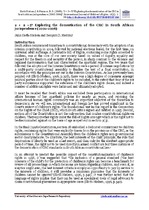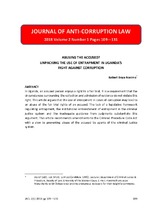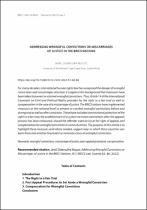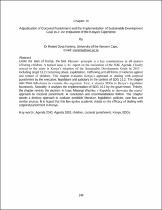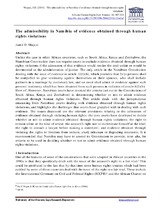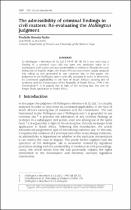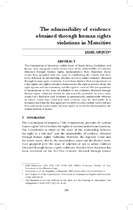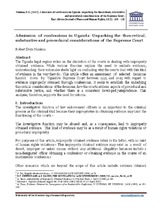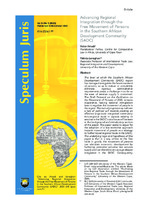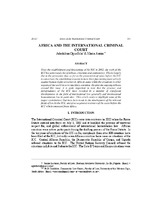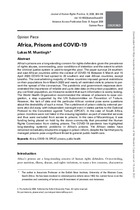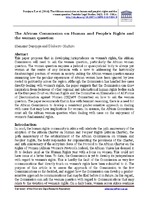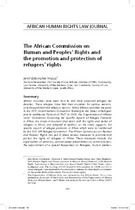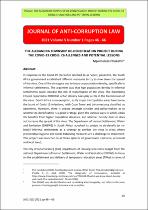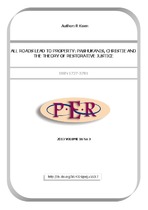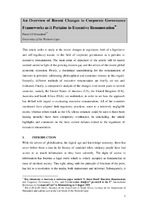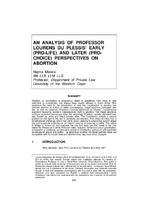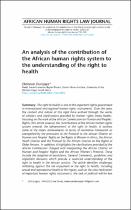Browsing Research Articles (Faculty of Law) by Title
Now showing items 1-20 of 431
-
2 + 2 = 5? Exploring the domestication of the CRC in South African jurisprudence (2002-2006)
(Brill Academic Publishers, 2008)South Africa commenced transition to a constitutional democracy with the adoption of an interim constitution in 1994, followed by national elections based, for the fi rst time, on universal adult suffrage. A justiciable ... -
Abusing the accused? Unpacking the use of entrapment in Uganda’s fight against corruption
(University of the Western Cape, 2018)In Uganda, an accused person enjoys a right to a fair trial. It is a requirement that the circumstances surrounding the collection and admission of evidence do not violate this right. This article argues that the use of ... -
Addressing wrongful convictions or miscarriages of justice in the BRICS nations
(University of Tyumen, 2022)For many decades, international human rights law has recognised the danger of wrongful convictions and miscarriages of justice. It is against this background that measures have been taken to prevent or combat wrongful ... -
Adjudication of Corporal Punishment and the Implementation of Sustainable Development Goal 16.2: An evaluation of the Kenyan Experience
(CEDRED Publications, 2020)Under the laws of Kenya, the best interests’ principle is a key consideration in all matters affecting children. A topical issue is its’ report on the realisation of the SDG Agenda. Closely related to the same is Kenya’s ... -
The admissibility in Namibia of evidence obtained through human rights violations
(Pretoria University Law Press, 2016)Unlike the case in other African countries, such as South Africa, Kenya and Zimbabwe, the Namibian Constitution does not require courts to exclude evidence obtained through human rights violations if the admission of that ... -
The admissibility of criminal findings in civil matters: Re-evaluating the Hollington judgment
(Pretoria University Law Press, 2021)In Hollington v Hewthorn & Co Ltd 2 1943 All ER 35 it was held that a finding of a criminal court did not have any probative value in a subsequent civil action and was inadmissible as evidence. Despite the case being one ... -
The admissibility of evidence obtained through human rights violations in Mauritius
(Juta Law Publishing, 2018)The Constitution of Mauritius, unlike those of South Africa, Zimbabwe and Kenya, does not guide courts on the issue of the admissibility of evidence obtained through human rights. Jurisprudence from Mauritius shows courts ... -
Admission of confessions in Uganda: Unpacking the theoretical, substantive and procedural considerations of the Supreme Court
(Makerere University, 2017)The Uganda legal regime relies on the discretion of the courts in dealing with improperly obtained evidence. While various theories explain the need to exclude evidence, understanding their rationales sheds light on ... -
Advancing regional integration through the free movement of persons in the Southern African Development Community (SADC)
(Nelson R Mandela School of Law, 2020)The level at which the Southern African Development Community (SADC) region has managed to regulate the free movement of persons, so as to reduce or completely eliminate, rigorous administrative requirements poses a ... -
Africa and the International Criminal Court
(Human Rights and Peace Centre, 2012)Since the establishment and functioning of the ICC in 2002, the work of the ICC has generated a lot of debate, criticisms and controversy. This is largely due to the perception that, as far as the prosecution of cases ... -
Africa, prisons and COVID-19
(Oxford University Press, 2020)Africa’s prisons are a long-standing concern for rights defenders given the prevalence of rights abuses, overcrowding, poor conditions of detention and the extent to which the criminal justice system is used to target ... -
The African Commission on Human and People's Rights and the woman question
(Springer, 2016)This paper proposes that in developing jurisprudence on women's rights, the African Commission will need to ask the woman question particularly the African woman question. The woman question requires a judicial or ... -
The African Commission on Human and Peoples' Rights and the promotion and protection of refugees' rights
(Pretoria University Law Press (PULP), 2009)African countries have been host to and have produced refugees for decades. These refugees have fled their countries for various reasons, including political and religious reasons. Many African countries are party to the ... -
The African Union two-dimensional solidarity normative agenda: between contestation and cooperation
(University of the Western Cape, 2024)The idea of solidarity is not neither new to Africa nor to African peoples. In fact, it was Obina Okere who once remarked that “African conception of man is not that of an isolated and abstract individual, but an integral ... -
The Alexandra township de-densification project during the Covid-19 crisis: Challenges and potential lessons
(University of the Western Cape, 2022)In response to the Covid-19 (hereafter referred to as ‘virus’) pandemic, the South Africa government established different measures to try to slow down the spread of the virus. One of the strategies was to focus on population ... -
All roads lead to property: Pashukanis, Christie and the Theory of Restorative Justice
(North-West University, 2013)The name of Evgeny Pashukanis, the Bolshevik jurisprudent, is linked umbilically to the so-called commodity form theory of law. In his Law and Marxism Pashukanis develops a general theory of law which turns upon the ... -
An overview of recent changes to corporate governance frameworks as it pertains to executive remuneration
(University of Fort Hare, 2012) -
An analysis of professor Lourens du Plessis’ early (pro-life) and later (prochoice) perspectives on abortion
(Nelson Mandela University, 2016)Abortion, or termination of pregnancy, albeit in gradations from most to less restrictive to unrestricted, has always been legally allowed in South Africa. This questions the need for the introduction of new law. ... -
An analysis of the contribution of the African human rights system to the understanding of the right to health
(African Human Rights Law Journal, 2021)The right to health is one of the important rights guaranteed in international and regional human rights instruments. Over the years the content and nature of this right have evolved through the works of scholars and ... -
An analysis of the duty to reasonably accommodate disabled employees: a comment on Jansen v Legal Aid South Africa
(University of the Western Cape, 2020)Persons with disabilities are a historically marginalised minority, who have the capacity to make a valuable contribution in the workplace. Recent case law suggests that the duty to reasonably accommodate disabled employees ...

